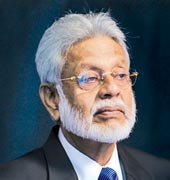SEC will come down hard on non-compliance - Chairman
The capital market is considered a vital conduit for long-term fund
mobilisation and a key driver of economic growth. As the capital market
regulator, our focus is to facilitate a fair, efficient, orderly and
transparent market, in which issuers can raise funds with adequate
safeguards to protect investors, Chairman, Securities and Exchange
Commission of Sri Lanka (SEC), Thilak Karunaratne said in the
Commission’s Annual Report.
|

SEC Chairman Tilak Karunaratne |
He said the regulatory framework of the securities market has been
designed to fulfill this mandate and ensure a reliable price discovery
mechanism, reasonable market access to all investors, prompt action to
contain market failures and timely and efficient dissemination of market
disclosures. The Commission continues to ensure that it strikes a
balance in regulation since over-regulation can stifle growth and
discourage active stakeholder participation.
An important aspect in maintaining the integrity of the market, and
making certain that investors are protected is the dissemination of
quality and reliable of information on an ongoing basis. Disclosures
increase the ability of investors to make informed investment decisions,
improve shareholder sentiment and deter management from engaging in
improper behaviour.
When material information is made available in a timely manner it can
also reduce the herd instinct of many investors.
Since the lack of reliable and timely information hinders market
development and investor confidence, the SEC will continue to impose
stringent rules and undertake rigorous enforcement action against
non-compliance.
“We continue to monitor, mitigate and manage risk to promote
integrity in the market. Since systemic risk has the potential to not
only affect the financial market but the entire economy as well, our
scope of supervision encompasses the identification of risk in regulated
entities, issuers, transactions and the market.
Through our Risk Based Supervisory Framework we focus on capital and
other prudential needs for market intermediaries, protect client assets
and compliance with internal controls on a regular basis,” Karunaratne
said.
Excerpts from the report
Our supervisory role further extends to mitigating the settlement
risk in the securities market. We will set up a Clearing House with the
Colombo Stock Exchange (CSE) which will act as a Central Counterparty (CCP)
for settlement of securities, shares, corporate debt and any other
instruments coming under our purview.
A consultancy firm specialising in capital market related assignments
globally, was entrusted with the task of implementing a full-fledged CCP.
This will significantly minimise the risk of settlement failure and
counter-party risk.
The SEC is firmly committed to taking rigorous action against those
who commit regulatory breach, which include market manipulation,
misconduct by regulated entities and corporate disclosure-related
offences. However, the Sri Lanka Securities Law, which was enacted 28
years ago, has its drawbacks inter alia the enforcement framework built
on criminal prosecution and compounding of offences.
Therefore, in the past the SEC mainly resorted to issuing warning
letters, imposing suspensions on investment advisers and compounding. In
tandem with the expansion of the capital market it is necessary to make
changes to the SEC Act to broaden the range of enforcement powers.
The proposed amendments to the SEC Act will introduce a range of
administrative and civil sanctions, including the seeking of restitution
to any person aggrieved. The SEC increased its efforts to expedite the
amendments since this will pave the way for credible regulation and
market confidence.
In addition the amendments to the Act will align the SEC governance
structure with International Organisation of Securities Commissions
(IOSCO) standards, facilitate the introduction of new categories of
market intermediaries and regulation of their business conduct and
provide for the regulation of derivative products. Investor confidence
can be described as the foundation on which the capital market is built
and sound governance will attract local and foreign investors and
stimulate economic growth. As the capital market regulator, the SEC
strives to promote good corporate governance practices through a
framework of rules and regulations which ensure accountability, fairness
and transparency.
However, upholding good corporate governance needs the concerted
efforts of all stakeholders of the capital market. We have achieved a
lot in the area of facilitating this but there is still much to be done
and we will continue to work in partnership with the capital market
industry to enhance corporate governance standards.
The need for investor education and financial literacy has never been
more important than today. Our investor education initiative is centered
on providing basic skills and knowledge to enhance investor protection,
promote investor confidence and foster investor participation in the
capital market.Since investor education is an essential regulatory tool
for empowering investors we deployed various channels and outreach
programs such as seminars, trade fairs, radio and television talk shows
to impart proper knowledge on investing in the capital market to
different segments of society. We anticipate that empowered investors
will take on more responsibility for their investment decisions.
Investor education is a shared responsibility and therefore, we work in
affiliation with other stakeholders to achieve this objective. Since the
quality of investment advice given to clients dependents on the quality
of investment advisers, the SEC provides capital market professionals
with the knowledge and skills to perform their duties properly. The SEC
anticipates that stock broking firms would adopt a robust training
regime to ensure industry participants perform duties in the clients’
best interests. |

